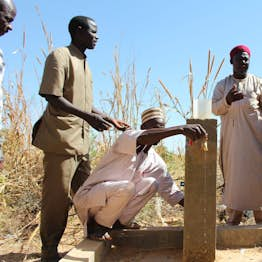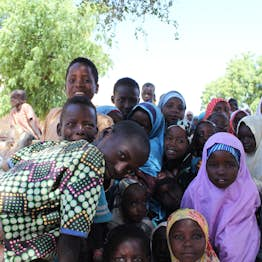Introduction
Development cooperation relations between Niger and Luxembourg date back to 1989, when Niger became a Luxembourg Development Cooperation partner country. The strengthening of these relations resulted in the signing of a first framework cooperation agreement on 12 July 1995, which was then replaced by a second agreement that made provision for a partnership committee to meet annually.
Read more
This is a forum dedicated to dialogue between the two countries, which also facilitates the examination of the state of play in development cooperation interventions. In 2021, development cooperation relations were governed by the third Indicative Cooperation Programme (ICP III), signed on 26 September 2015. Initially covering the period 2016 – 2020, it was extended until 31 December 2021. In addition, the programmes for education and teaching, training and vocational integration, support for sustainable agricultural development and capacity-building of the actors in the public expenditure chain have been extended until 30 June 2022, without any budgetary implications, to enable these programmes to be closed in an orderly way and the new ones to be launched. Having had an initial indicative financial envelope of EUR 67 million, ICP III’s total indicative budget was EUR 118 million in 2021, demonstrating the dynamism of Luxembourg Development Cooperation in Niger, which remains the partner country with the largest financial envelope. ICP III focuses on (i) basic education and technical and vocational training, (ii) water and sanitation, (iii) sustainable agricultural development and (iv) public finance. The bilateral interventions in these areas are implemented by LuxDev, the Luxembourg agency for development cooperation. Despite the worsening security situation in the Sahel and in Niger in particular and its implications in terms of development cooperation, the implementation of the various Luxembourg development programmes has continued without incident.
Luxembourg Development Cooperation within the framework of ICP III has led to visible results: in the water and sanitation sector, since 2016 Luxembourg has been implementing a multi-donor programme with a budget of approximately EUR 85 million (including EUR 42 million from Luxembourg), which has contributed to the construction of 160 drinking water supply systems, corresponding to 57 000 newly-served households. 300 public latrines have been installed in schools, health centres and public places. In addition, 100 cemented wells and 20 rural pumping stations have been built. These achievements have been accompanied by social mediation, leading to the signing of 110 social agreements designed to avoid conflicts around these new water points. Since 2005, Luxembourg’s interventions in the education sector have helped to build more than 650 schools and 140 literacy centres, providing 23 000 beneficiaries with access to literacy programmes. In the vocational training sector, Luxembourg Development Cooperation has strongly supported the craft sector in Niger and has supported the creation of 13 craft villages. 17 training centres have been built and 171 centres have been provided with equipment that has been made available to 38 500 learners across the country. Within the framework of sustainable agricultural development, 11 295 young people have been trained in the agricultural production and processing sectors (of whom 59% are women). The programme has also supported 8 928 young people through agricultural support, 6 867 producers (51% of whom were women) were given a loan to start up an agricultural activity and 7 556 hectares of degraded land were recovered and rehabilitated for the benefit of 7 700 young farmers (61% of whom were women). Interventions to support the public expenditure chain, in collaboration with the National School of Administration (ENA) in Niger, have trained 240 officials from the Ministry of Finance.
As part of the working visit to Luxembourg on 19 May 2021 by Mohamed Bazoum, President of the Republic of Niger, Minister Fayot and Minister Massoudou (Minister of Foreign Affairs and Cooperation) signed the 4th Indicative Cooperation Programme (ICP IV, 2022 – 2026) between Luxembourg and Niger, with an indicative financial envelope of EUR 144.5 million. ICP IV thus confirms Niger as the recipient of the largest amount of official development assistance (ODA) among Luxembourg’s partner countries. While aiming for continuity in terms of sectors of intervention, ICP IV seeks to respond to the changing context in Niger, particularly in terms of the worsening security situation and its consequences at the humanitarian level. ICP IV identifies three priority areas of intervention: the provision of and inclusive access to basic social services such as water, sanitation, habitat, and food and nutrition security; the development of human capital through support for education, technical and vocational training, adolescent empowerment and socio-economic integration; and strengthening governance, particularly by providing support to the capacities of public authorities to enable them to provide the basic social services, public finance management and inclusive finance that are needed.
Following the working visit by the President of Niger, the 13th partnership committee meeting was held on 11 June 2021 by video-conference, co-chaired by the Directors of Cooperation. The meeting provided an opportunity to take stock of the progress of ongoing cooperation programmes and the areas of intervention of the new ICP IV. The formulation of the new ICP IV programmes was launched on 25 November 2021 in Niamey. In order to apply the lessons learned in implementing the current ICP, the partners decided to extend most of the current programmes until June 2022, without any budget increase. At the end of 2021, the financial execution of ICP III was close to 100%, highlighting the smooth running of Luxembourg Development Cooperation programmes in Niger and the efficiency of the sectoral approach, which promotes alignment with and use of national systems, and thus ownership and capacity-building.
In the framework of multilateral cooperation, under ICP III from 2016 to 2021 Luxembourg supported two programmes implemented by UN agencies with a total budget of EUR 11.75 million. In collaboration with the Ministry of Health, the EUR 5 million partnership between the United Nations Children’s Fund (UNICEF) and Luxembourg supports the national nutrition security strategy. The programme of support for the integration of adolescent girls’ rights and health, and the control of population growth, into policies and programmes ( “Illimin” project), with a budget of EUR 6.7 million, is implemented by the United Nations Population Fund (UNFPA).
Finally, in 2021, the Luxembourg government signed framework agreements with seven Luxembourgish NGOs that are active in Niger and which continued to implement their projects despite the health crisis, often through local partners. In 2021, EUR 1 419 751.10 euros were implemented in Niger by Luxembourgish NGOs.
In the context of a food and nutrition crisis in the Sahelian sub-region, Luxembourg Development Cooperation has also provided additional support of EUR 1 million to the National Food Crises Prevention and Management Mechanism (DNPGCA) with the aim of meeting the food needs of the most vulnerable groups and in response to the Niger government’s call for international solidarity, bringing total support for the mechanism to EUR 5 million.
Development of PDA
Again within the framework of ICP III, Luxembourg continued its financial support for the national response to the pandemic. Through the partnership started in 2020 between Luxembourg, the European Union and the Belgian development agency Enabel, within the framework of the Team Europe-Niger approach, it helped to strengthen and maintain the capacities of the health system in order to ensure the effectiveness of prevention and preparedness, detection and response to the COVID-19 threat.
Reference data
- Population (MIO): 24,21
- GNI (per resident): 1.230
- Human Development Index (HDI): 189/189
- Life expectancy: 63

